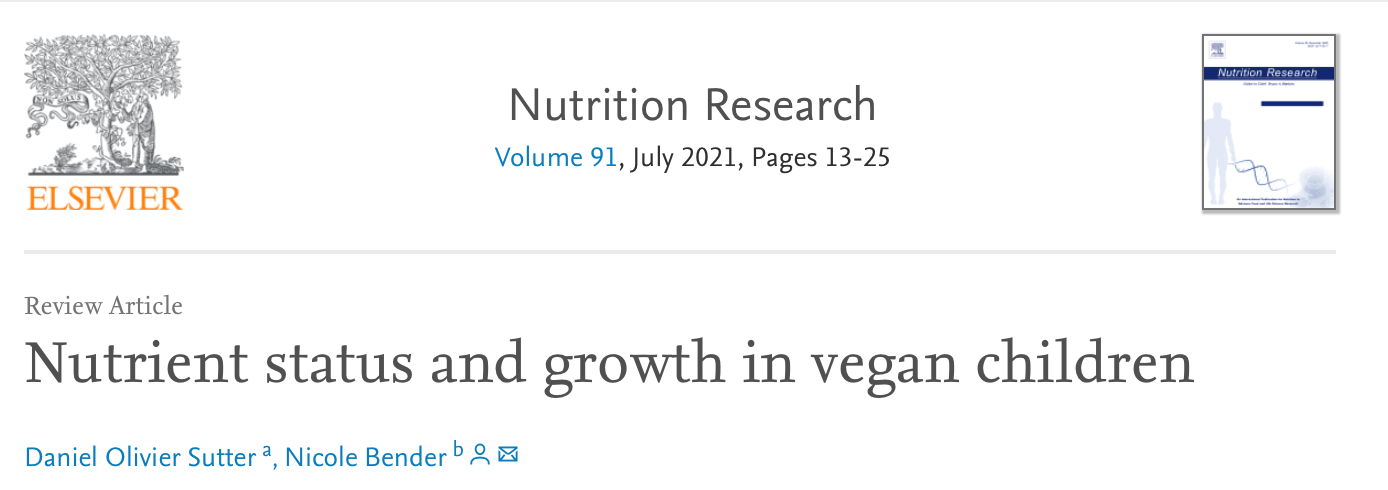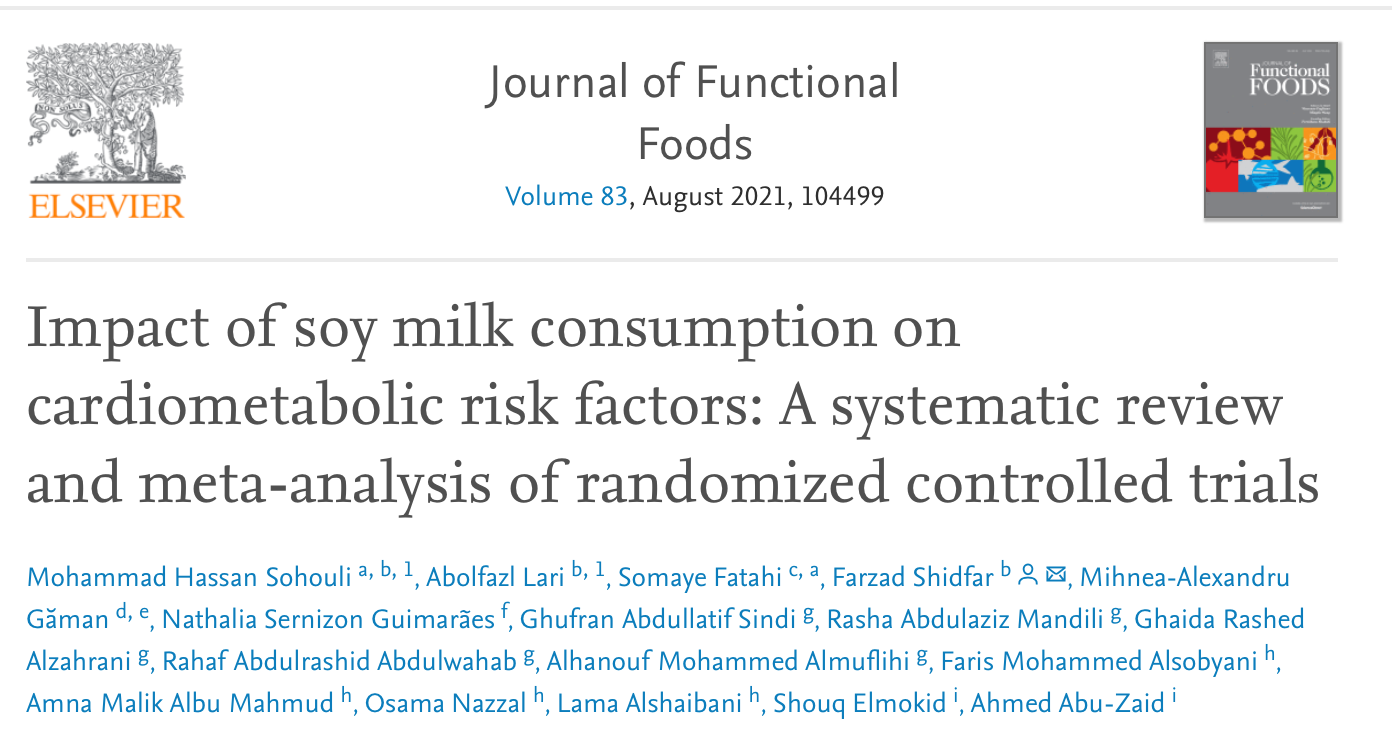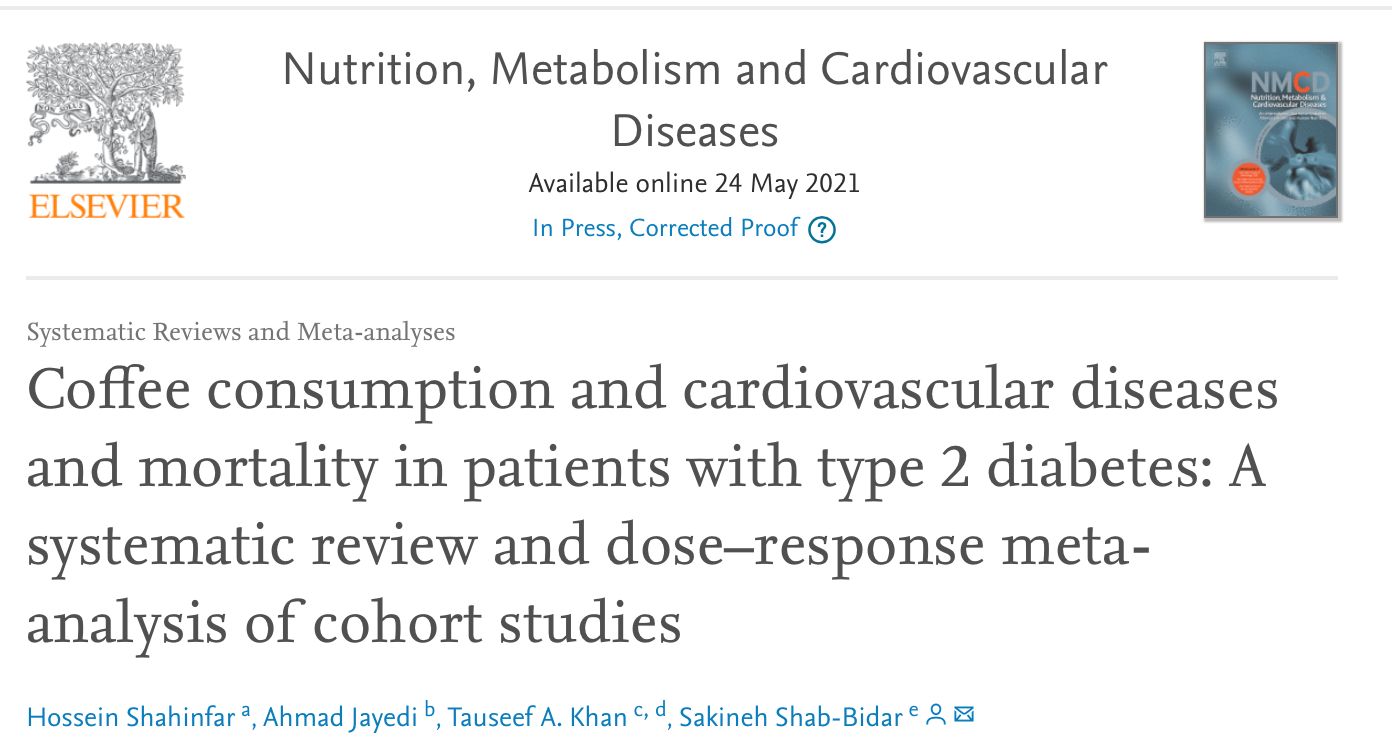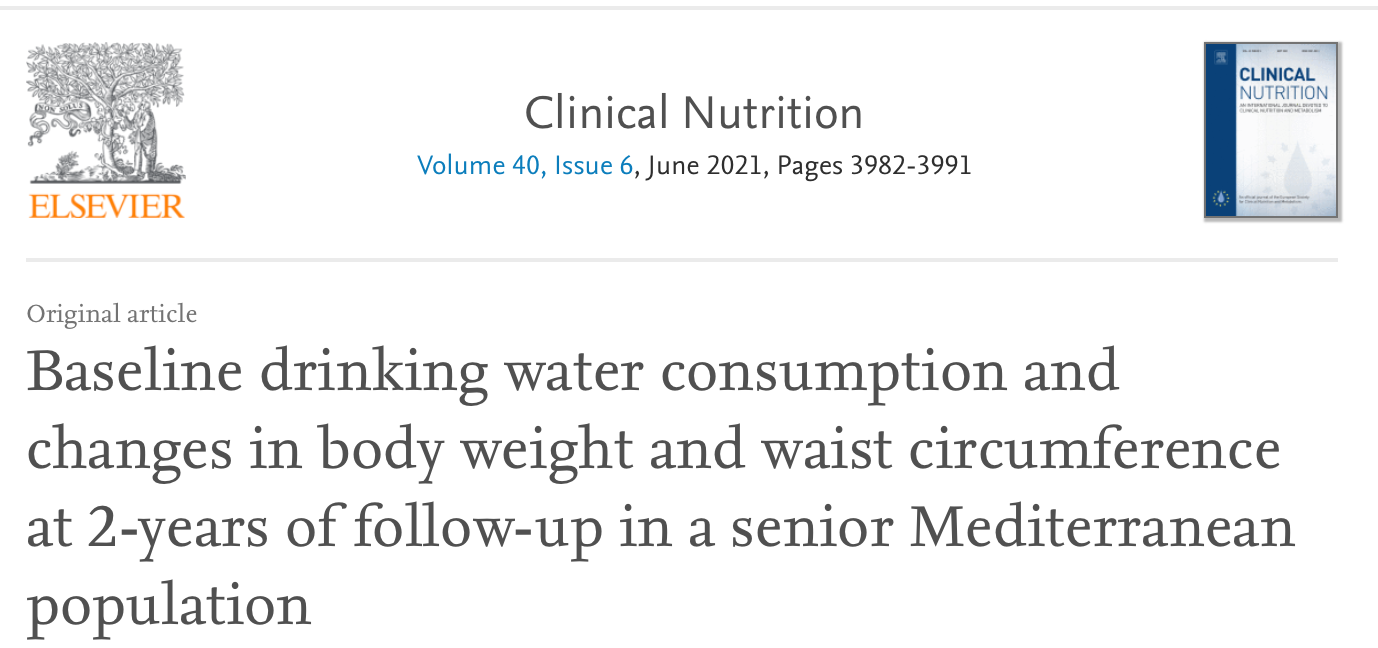A review of the week’s plant-based nutrition news 20th June 2021
This week I cover a review on vegan diets for children, biomarker analyses in veggie and vegan diets and data on healthy drinks.

VEGAN DIETS IN CHILDREN: This is an extremely useful review of the data summarising both the benefits and cautions relating to raising vegan children. The take home message is, that from the available data it is likely that a vegan diet can provide all the necessary nutrients for normal growth and development of children with some clear advantages for cardiometabolic health. This is in line with the guidance from most major dietetic associations including the BDA in the UK.
The review includes 437 publications and the authors review the adequacy of vegans diets to provide certain nutrients and to support growth and development. Starting with energy and protein intake, its clear that a vegan diet can provide sufficient calories and more than enough protein, often exceeding recommended intakes. Iron intake is often higher than recommended in vegan children, but because of the lower bioavailability this often translates into lower ferritin levels (stored iron), which is not necessary a negative finding. Differences in haemoglobin levels and presence of iron deficiency anaemia are less obvious when comparing vegans to omnivores but iron status does seem to vary quite a bit between difference studies. In general, calcium intakes in vegan children are lower than recommended as is vitamin D, although the latter remains an issue for all diet patterns. Vitamin B12 is not a issue when children are appropriately supplemented. Folate deficiency is a concern amongst omnivorous children and adults but as would be expected this is less of a concern in vegan children consuming a healthy diet.
Most studies confirm that vegan children have normal growth rates, well within the normal range. Some but not all studies have shown a slightly reduced height in younger vegan children, around 1–3 cm, compared to omnivores but it has to be noted that our normal ranges relate only to omnivorous diets and the impact of these small differences are unlikely to be clinically relevant or impact health outcomes. As expected, vegan children display a more healthy body mass index than omnivorous children.
In the discussion the authors go on to discuss the numerous potential advantages of a vegan diet in children. These include the lower intake of saturated fat, the increased consumption of fibre and phytonutrients and a lower body weight and body fat. The authors conclude that there is still limited data on vegan diet in children and as always more studies are desirable but state that with appropriate supplementation and attention to key nutrients, a vegan diet can support normal growth and development with some health advantages.

BIOMARKERS IN UK PARTICIPANTS CONSUMING DIFFERENT DIETS: This is a detailed paper measuring a large array of blood and urine biomarkers that are known to be associated with certain health outcomes. The study reports data from the UK biobank which recruited 500,000 participants in the UK between 2006 and 2010. This cross sectional analysis analysed biomarkers by 6 diet groups (regular meat eaters, low meat eaters, poultry eaters, fish eaters, vegetarians, vegans n=416) in 466,058 White British participants and 2 diet groups (meat eaters, vegetarians n=1444) in 5535 British Indian participants. There are a lot of data so I summarise the important highlights where results were statistically and clinically meaningful. The 34 biomarkers were grouped as those related to cardiovascular health, diabetes, bone and joint health, cancer-related, kidney and liver-related. For most of the measurements there was a gradient across diet groups as animal products were removed from the diet and mostly in a good way!
Cardiovascular biomarkers: As expected in White British participants the gradual removal of animal ‘foods’ from the diet from meat eaters through to vegans resulted in improved markers of cardiovascular health with lower levels of cholesterol and it’s subfractions and lower CRP, a marker of inflammation. These results were partly attenuated when adjusted for BMI. However, vegetarians had the highest triglyceride levels. In British Indians, vegetarians had significantly lower cholesterol and subfraction levels but CRP levels did not differ between groups. Overall, these results support the lower risk of cardiovascular disease, especially ischaemic heart disease, in those avoiding meat consumption. The meat eaters in this study had a much higher rate of lipid lowering medication use, 18.4% compared to 5.8% in vegans. Of note though, British Indians had a pretty high rate of lipid-lowering medication use and more than the White participants.
Bone and joint–related biomarkers: Vitamin D levels were lower in British vegetarians and vegans and British Indian vegetarians even when taking supplementation and time of year into consideration. This confirms data from other studies demonstrating the need for adequate vitamin D supplementation in vegetarians and vegan and may in some part explain the potential increased risk of bone fractures in those avoiding meat consumption.
Cancer-related biomarkers: In White British participants, all other diet groups had higher serum Sex Hormone Binding Globulin (SHBG) when compared to regular meat eaters, whereas vegetarians and vegans had lower IGF-I concentrations. In British Indians, vegetarians had lower serum IGF-I concentrations than meat eaters, but no significant differences were observed in SHBG levels. SHBG binds sex steroid hormones but may also have function beyond just sex hormone binding. Higher levels are associated with lower oestrogen and testosterone levels although its worth noting the current study measured testosterone levels which did not differ remarkably between diet groups and the study did not measure oestrogen levels. Several previous studies have reported associations with higher SHBG and lower IGF-1 levels and a lower risk of cancer and this may in part explain the reduced risk of cancer in vegans and those on a healthy plant-based diet.
Kidney-related: All diet groups avoiding meat had lower concentrations of serum and urinary creatinine and lower urea. Less favourable findings were higher urine potassium to creatinine and sodium to creatinine ratio and higher levels of blood cystatin C in vegetarians and vegans. Vegans also had higher blood urate levels but all the other diet groups had lower levels than meat eaters. These findings probably need further investigation as they only in part explain the clinical data we have showing that healthy plant-based diets are associated with a lower risk of renal failure (14% reduction in risk) and vegetarians have a reduced risk of dying from renal failure and developing renal stones. Although vegans have higher urate levels we don’t have any specific data on renal health in vegans or the risk of renal stones. Don’t forget that although animal protein contributes significantly to urate levels, so does fructose (found in processed foods) and without knowing the diet quality of these participants, it is difficult to comment on the reasons for these findings.
Liver-related: Those avoiding meat had improved liver enzyme profiles, which may explain clinical observations of lower risk of fatty liver in those avoiding of limiting animal ‘foods’.
Diabetes-related: No significant differences between diet groups were seen as any potential differences were attenuated when adjusted for BMI meaning that body weight is the main predictor of diabetes risk. Of note, 30% of White vegetarians and vegans and 65% of vegetarian Indian participants had a BMI over 24.9. In fact, a normal BMI for Indians is considered <23. The Indian participants in general had a pretty high rate of diabetes medication use (in supplementary data this is 10–15%, but in Table 1 of the main paper the numbers don’t seem to add up to 100!). We know in general that the consumption of a healthy plant-based diet that avoids or minimises animal foods and processed foods is associated with a lower risk of developing type 2 diabetes but unhealthy plant-based diet consisting of refined grains and processed foods and drinks elevated the risk. Many British Indian diets are now pretty high in refined grains, sugar and oil.
Overall, this study supports several benefits of vegetarian and vegan diets with the most significant findings supporting cardiovascular health and possibly cancer risk and liver health. The main limitation of this study is that data on diet quality was not presented and when considering the fact that a significant proportion of vegetarians and vegans were overweight or obese and a high proportion of Indian participants had type 2 diabetes, it might be assumed that the diets were not optimal in quality. The data cannot prove cause and effect and we only have information from one point in time with no further information on long term health outcomes. Main take home message for vegetarians and vegans is to optimise diet quality whilst limiting processed foods and supplement adequately with vitamin D (which may involve measuring blood levels now and again).

SOYA MILKS AND CARDIOMETABOLIC RISK FACTORS: Only this week in clinic, one of my patients told me he was avoiding soya as he had read that it was unhealthy! These myths are SO prevalent yet the scientific data could not be more certain. Minimally processed soya foods and soya milk are HEALTHY! In fact soya has a legitimate health claim supporting its consumption as heart healthy (soya protein lowers cholesterol level) although this is currently under review.
This meta-analysis included data from 18 randomised controlled studies (665 participants, age range 18–65 years) with most comparing a soya milk intervention with cow’s milk. Of note, several of the studies were also calorie-restricted in both groups. Some studies included people with underlying health conditions and others healthy individuals. The amount of soya milk consumed per day was 240 to 1000mls and study length generally short (3–12 weeks) with most being around 4 weeks long.
The results showed that soya milk significantly reduced total and LDL-cholesterol but did not affect HDL-cholesterol or triglyceride levels. Soya milk consumption also significantly lowered systolic and diastolic blood pressure in the order of 7mmHg and 4mmHg respectively. Soya milk consumption significantly reduced the level of two inflammatory markers, CRP and tumour necrosis factor-alpha, but not IL6 or fibrinogen. There was no significant difference in body weight but a significant reduction in waist circumference. In addition, there were no differences found for fasting blood glucose and insulin levels.
Overall, these data, albeit in a relatively small number of participants, support swapping cow’s milk for soya milk. The authors conclude ‘incorporating soy milk into the diet might favorably affect several cardiometabolic risk factors in both healthy and unhealthy individuals’. I say, ‘why wait till you are unhealthy?’ Make the swap today. For more information of the positive healthy impact of soya, check out our website article by Dr Nitu Bajekal, women’s health expert.

COFFEE CONSUMPTION IN PEOPLE WITH TYPE 2 DIABETES: Coffee sometimes gets a bad wrap. If you enjoy it and it does not cause any adverse side effects, then I don’t have a problem with drinking coffee as long as its not loaded with sugar, cream and dairy and it’s consumed earlier in the day to limit impact on sleep. Several studies support potential health benefits and at worst a neutral effect on health.
This study investigates the impact of coffee consumption on cardiovascular health in people with type 2 diabetes. Ten prospective cohort studies with 82,270 cases were included. When comparing no coffee consumption to those consuming 4 cups per day, the results showed a 21% reduction in all-cause mortality, 40% reduction in cardiovascular death, 32% reduction in coronary heart disease death and 23% reduction in cardiovascular events. There was no impact on cancer death or stroke risk. Overall there was a dose-response but no further benefit beyond 4 cups per day.
Of course, no one food or drink is going to be the cure all and adding coffee to an unhealthy diet is not the answer. However, as part of healthy plant based diet, coffee can be enjoyed if desired and is certainly better than drinking sugar-sweetened beverages and alcohol.

WATER FOR THIRST: This is the mantra of the whole food plant-based brigade and for good reason. This paper uses a subset of data from the now pretty famous PREDIMED study which showed us that a Mediterranean diet with olive oil or nuts was better for heart health than a more conventional Western-style diet. In this study, 1905 participants aged 55–75 years who met criteria for metabolic syndrome were assessed at 1 and 2 years. The impact of water consumption (tap or bottled) on changes in body weight were assessed. Water consumption was categorised into 4 groups; <2.5, 2.5-<5, 5-<7.5 and >7 servings per day (serving = 200mls). This was the compared with the consumption of other liquids including dairy beverages (whole and reduced dairy beverages), sugary beverages and artificially sweetened beverages, soups, coffee (50 mL) and tea (200 mL); the alcoholic beverages included servings of wine, beer, spirits and mixed alcoholic beverages and servings from other beverages group (plant-based drinks, non-alcoholic beer, sorbets and jellies, and meal replacement shakes). Incredibly the authors state this is the ‘first epidemiological study to prospectively analyse the association between drinking water consumption and long-term body weight changes in an elderly population with overweight/obesity and metabolic syndrome’.
The results showed that over the 2 years period. Participants consuming more than 2.5 servings of water per day had significant reductions in body weight compared to those consuming less than 2.5 servings. At two-years of follow-up, participants who consumed between 5 and 7.5 servings/day and those consuming 7.5 servings/day showed greater reductions in body weight. Substitution analysis comparing the impact of water consumption instead of any of the over liquids stated above resulted in greater weight loss, meaning that water is the better choice. Surprisingly, substituting water for sugar-sweetened beverages seemed to have a minimal impact and neither did artificially-sweetened beverages but this may be because the consumption of these types of drinks was pretty low in this cohort. In addition, water was better for weight loss than drinking tea and coffee, although these findings are limited by not been able to account for what other items were included as part of these drinks i.e. sugar, cream etc. However, water consumption was certainly better than alcohol although less so when compared with wine.
The conclusions are of no surprise. Water is a healthy beverage choice and can support weight loss and limit weight gain. Therefore, as part of a healthy plant-based diet, water should be the main beverage of choice and tea and coffee can be included if enjoyed.
If you have found this article useful, please follow my organisation ‘plant-based health professionals UK’ on Instagram @plantbasedhealthprofessionals and facebook. You can support our work by joining as a member or making a donation via the website.
